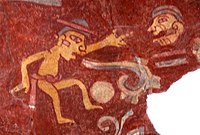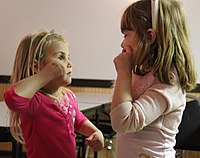Portal:Language
Introduction




Language is a structured system of communication that consists of grammar and vocabulary. It is the primary means by which humans convey meaning, both in spoken and signed forms, and may also be conveyed through writing. Human language is characterized by its cultural and historical diversity, with significant variations observed between cultures and across time. Human languages possess the properties of productivity and displacement, which enable the creation of an infinite number of sentences, and the ability to refer to objects, events, and ideas that are not immediately present in the discourse. The use of human language relies on social convention and is acquired through learning.
Estimates of the number of human languages in the world vary between 5,000 and 7,000. Precise estimates depend on an arbitrary distinction (dichotomy) established between languages and dialects. Natural languages are spoken, signed, or both; however, any language can be encoded into secondary media using auditory, visual, or tactile stimuli – for example, writing, whistling, signing, or braille. In other words, human language is modality-independent, but written or signed language is the way to inscribe or encode the natural human speech or gestures.
Depending on philosophical perspectives regarding the definition of language and meaning, when used as a general concept, "language" may refer to the cognitive ability to learn and use systems of complex communication, or to describe the set of rules that makes up these systems, or the set of utterances that can be produced from those rules. All languages rely on the process of semiosis to relate signs to particular meanings. Oral, manual and tactile languages contain a phonological system that governs how symbols are used to form sequences known as words or morphemes, and a syntactic system that governs how words and morphemes are combined to form phrases and utterances.
The scientific study of language is called linguistics. Critical examinations of languages, such as philosophy of language, the relationships between language and thought, how words represent experience, etc., have been debated at least since Gorgias and Plato in ancient Greek civilization. Thinkers such as Jean-Jacques Rousseau (1712–1778) have argued that language originated from emotions, while others like Immanuel Kant (1724–1804) have argued that languages originated from rational and logical thought. Twentieth century philosophers such as Ludwig Wittgenstein (1889–1951) argued that philosophy is really the study of language itself. Major figures in contemporary linguistics include Ferdinand de Saussure and Noam Chomsky. (Full article...)
Selected language -
Lakota (Lakȟótiyapi [laˈkˣɔtɪjapɪ]), also referred to as Lakhota, Teton or Teton Sioux, is a Siouan language spoken by the Lakota people of the Sioux tribes. Lakota is mutually intelligible with the two dialects of the Dakota language, especially Western Dakota, and is one of the three major varieties of the Sioux language.
Speakers of the Lakota language make up one of the largest Native American language speech communities in the United States, with approximately 2,000 speakers, who live mostly in the northern plains states of North Dakota and South Dakota. Many communities have immersion programs for both children and adults. (Full article...)
Did you know (auto-generated)

- ... that Michael Huber's translation of Salomon Gessner's works into French made Gessner the best-known German-language poet in Europe before Goethe?
- ... that the seven leaders of the East Turkestan Revolutionary Party had Uyghur-language code names, the initials of which spelled out the word Lëninchi, meaning "Leninist"?
- ... that English missionary Reverend Thomas Sparshott co-wrote a book in Swahili, and his daughter Margaret Elwyn Sparshott was responsible as matron for 22 hospitals in World War I?
- ... that when Felicia Schroeder signed to play soccer for the University of South Carolina, the school did not have a sign-language interpreter available for her?
- ... that Australia has three major Japanese language schools?
- ... that Luis Alegre Salazar led the translation of the constitution of the Mexican state of Quintana Roo into Maya?
More did you know -
- ...that there are seven dialectal groups of the Polish language, each primarily associated with a certain geographical region?
- ...that the Noric language is attested in only two inscriptions, one from Grafenstein, Austria, and the other from Ptuj, Slovenia?
- ...that Soviet literature declared Russian the "world language of internationalism", denouncing French as the "language of fancy courtiers" and English as the "jargon of traders"?
- ...that the Himariote Greek dialect retains several archaic features no longer found in standard modern Greek?
Categories
Linguistics: Computational linguistics • Grammar • Historical linguistics • Morphology • Phonetics • Phonology • Pragmatics • Reading • Semantics • Sociolinguistics • Syntax • Writing
Languages: Language families • Pidgins and creoles • Sign languages
Linguists: By nationality • Historical linguists • Morphologists • Phoneticians • Phonologists • Sociolinguists • Syntacticians • Translators
Stubs: Constructed languages • Languages • Linguists • Pidgins and creoles • Typography • Vocabulary and usage • Writing systems
Full Language category tree
|
|---|
|
Select [►] to view subcategories
|
Related portals
Selected topic -
The Global Language Monitor (GLM) is a company based in Austin, Texas, that analyzes trends in the English language. (Full article...)
Selected picture -

Countries and regions where Portuguese has official status
Language News
- 1 March 2025 – Executive orders in the second presidency of Donald Trump
- United States President Donald Trump signs an executive order designating English as the country's official language. (The Guardian)
- 27 February 2025 –
- OpenAI releases their latest large language model, GPT-4.5. (The Verge)
- 22 November 2024 – Censorship in Belarus
- In a speech at Minsk State Linguistic University, Belarusian President Alexander Lukashenko threatens to shut down the Internet in his country if there are mass protests before the upcoming presidential election after the previous election saw mass protests. (Rferl)
Topics

Languages of Africa: Arabic, Chadic, Cushitic, Kanuri, Maasai, Setswana, Swahili, Turkana, Xhosa, Yoruba, Zulu, more...
Languages of the Americas: Aleut, Carib, Cherokee, Inuktitut, Iroquois, Kootenai, Mayan, Nahuatl, Navajo, Quechuan, Salish, American Sign Language, more...
Languages of Asia: Arabic, Assamese, Balochi, Bengali, Chinese, Japanese, Hajong, Hebrew, Hindustani, Kannada, Kokborok, Marathi, Khasi, Korean, Kurdish, Malayalam, Manipuri, Meithei, Mongolian, Persian, Rajasthani, Sindhi, Sanskrit, Sylheti, Tamil, Tanchangya, Tulu, Telugu, Tibetan, Thai, Turkish, Vietnamese, Khowar, more...
Languages of Austronesia: Austric, Fijian, Hawaiian, Javanese, Malagasy, Malay, Maori, Marshallese, Samoan, Tahitian, Tagalog, Tongan, Auslan, more...
Languages of Europe: Basque, Czech, Danish, Dutch, English (book), French, German, Greek, Italian, Latin, Leonese, Norwegian, Polish, Portuguese, Romanian, Russian, Slovak, Spanish, Ukrainian more...
Constructed languages: Esperanto, Ido, Volapük, more...
Agglutinative language, Analytic language, Constructed language, Creole, Context-free language, Extinct language, Dialect, Fusional language, Inflectional language, International language, Isolating language, Language isolate, National language, Natural language, Pidgin, Pluricentric language, Polysynthetic language, Proto-language, Sign language, Spoken language, Synthetic language, Variety (linguistics)

Applied linguistics, Cognitive linguistics, Accent (dialect), Computational linguistics, Descriptive linguistics, Eurolinguistics, Generative linguistics, Historical linguistics, Lexicology, Lexical semantics, Morphology, Onomasiology, Phonetics, Phonology, Pragmatics, Prescription, Prototype semantics, Psycholinguistics, Semantics, Stylistics, Sociolinguistics, Syntax
See also: List of linguists

Alphabets: Arabic alphabet, Bengali alphabet, Cyrillic alphabet, Hebrew alphabet, Latin alphabet, more...
Other writing systems: Abjad, Abugida, Braille, Hieroglyphics, Logogram, Syllabary, SignWriting, more..
See also: History of the alphabet, Script
Associated Wikimedia
The following Wikimedia Foundation sister projects provide more on this subject:
-
Commons
Free media repository -
Wikibooks
Free textbooks and manuals -
Wikidata
Free knowledge base -
Wikinews
Free-content news -
Wikiquote
Collection of quotations -
Wikisource
Free-content library -
Wikiversity
Free learning tools -
Wiktionary
Dictionary and thesaurus
Find a language
| Enter an ISO 639 code to find the corresponding language article |






















